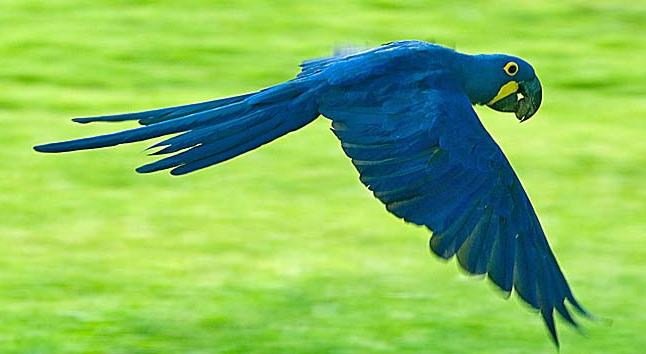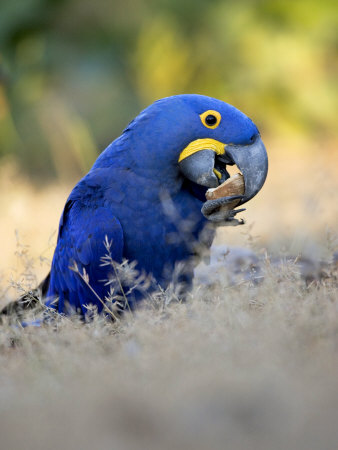Exotic Wings Productions now features one of the most famous and SPECTACULAR birds species on the planet! ...
The hyacinth macaw is found in lightly forested and seasonally flooded grasslands in Brazil, Bolivia and Paraguay (Foundation for the Preservation of the hyacinth macaw, accessed 3/31/03). The blue and yellow hyacinth macaw, which grows to be up to 40 inches (1 m) long, is the largest species of macaw (Kasnoff, 07/02/96). Hyacinths can weigh over 4 pounds. They have black beaks with bright yellow along the sides of the lower part of the beak and around the eyes. The female and male are nearly indistinguishable although the female is more slender (Ensor, May 2001).
The hyacinth macaw eats the nuts of two types of palm trees: the acuri and the bocaiúva. It recycles the acuri nut by only eating ones that have fallen from the trees and have passed through cattle or wild animals. The bocaiuva nut is eaten directly from the trees (WWF, accessed 3/31/03).
Young Hyacinths stay with their parents until they are six months old. The Hyacinth is mature and begins breeding at seven years. The average female will have two young at a time. She is responsible for the incubation of eggs while the male is responsible for providing food for the female. The incubation period for the eggs is 28 days (WWF, accessed 3/31/03). Hyacinth eggs and young are vulnerable to predation by cockroaches, ants and other birds such as toucans, hawks, and jays. They are also vulnerable to predation by some mammals, including the coati (WWF, accessed 3/31/03). The lifespan is still uncertain but may be up to 60 years (Crystal Gardens, accessed 3/31/03).
Hyacinths fly in small groups or in pairs. In the late hours of the afternoon, they congregate in places called "dormitories", which appear to be "centers for the exchange of information." Hyacinths are very social and couples are very faithful—they mate for life (WWF, accessed 3/31/03).
Source: Parco Zoo Punta Verde Source: Cornell University Source: Tropical Nature
Did you know?... Hyacinths are extremely rare and are quite expensive. To own this bird, be prepared to be placed on a waiting list and spend between $7000- $12,000!
Authors: Eli Levine & Hannah Chick
Click here to add text.

